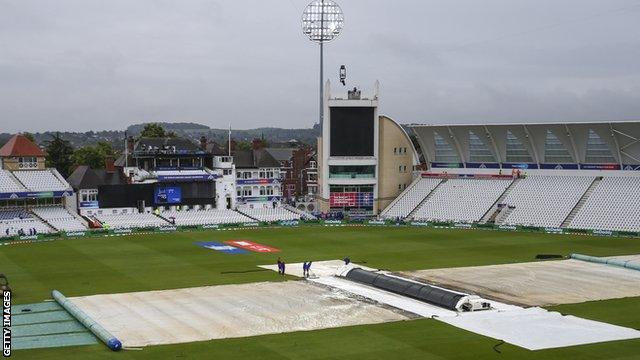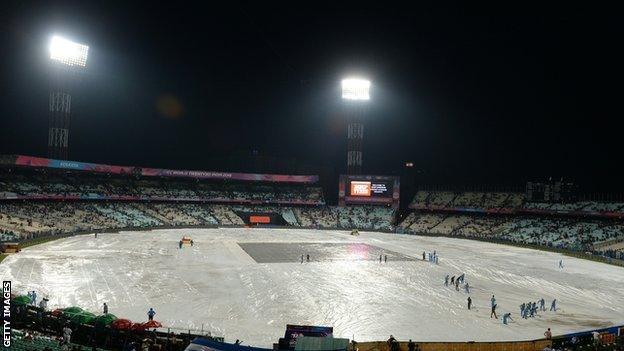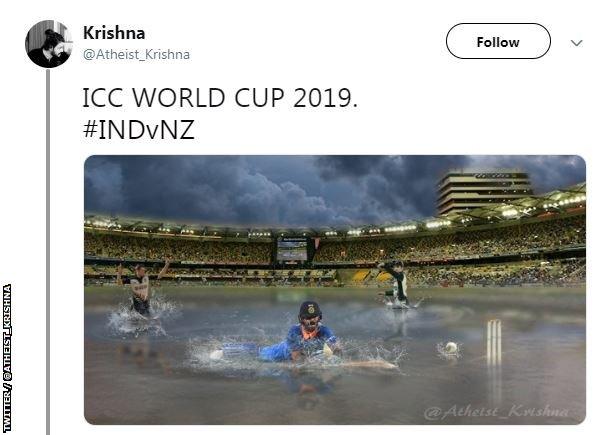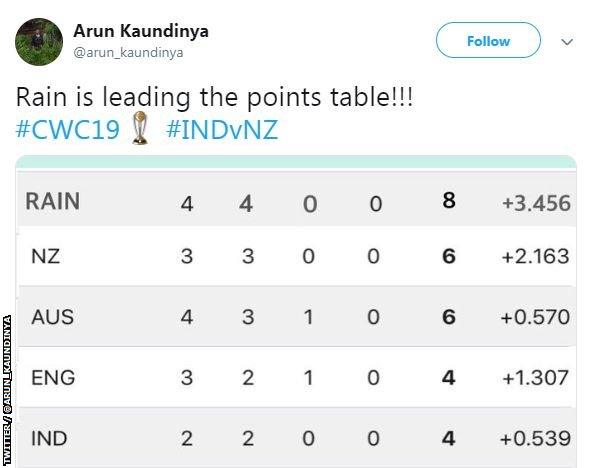Cricket World Cup: What to do about the rain?
- Published

India v New Zealand at Trent Bridge was rained off, making it the fourth game to be abandoned without a ball being bowled
It has been a very wet week in the Cricket World Cup.
India's match against New Zealand at Trent Bridge on Thursday was the fourth match of the tournament to be abandoned so far, and the third to be called off without a ball being bowled.
This has already surpassed the previous highest number of washed-out matches in a World Cup - two in 1992 and 2003.
Frustrated fans and bemused onlookers have been offering up solutions - but how feasible are they?
Build a roof

The retractable roof on Wimbledon's Centre Court was unveiled in 2009
A common request, especially in light of Wimbledon adding a retractable roof to Court One in addition to the one over Centre Court in time for this year's Championships.
But putting a roof over a cricket ground would be much more complex and costly - tennis stadiums are smaller and most are level, whereas cricket grounds in England and Wales have different-sized stands.
It cost an estimated £100m and £70m to build the respective roofs at Wimbledon, which crucially is also the sole location for that entire tournament.
It is unfeasibly expensive to build roofs at the 11 cricket grounds hosting a World Cup fixture, even before adding in the cost of first adapting the grounds into a shape that would hold a roof.
Cover the whole playing surface in a sheet
If you watched England's tour of Sri Lanka last autumn you will have seen the host groundstaff sprinting to cover the entire outfield in a massive tarpaulin whenever it started to rain.
This has the advantage of preventing wet patches forming on the outfield and means it should be quicker to resume play when the rain stops - India against New Zealand never got under way, in part because of muddy areas that did not dry.
It also could prevent a match starting late because of rain on previous days. So why not invest in some big sheets?
As Cricinfo points out,, external this system needs a lot of groundstaff to be successful and grounds over here may not be able to afford employing the amount of people required.
Such a covering has also been used in the UK before - Edgbaston had the 'Brumbrella' from 1981 to 2001, but it was banned after the ECB found flat covers encouraged 'sweating', making the pitches damper and therefore much more difficult to bat on.

Eden Gardens in Kolkata, India, has adopted the Sri Lankan method of covering the entire outfield
Reserve days
Reserve days were used the last time England hosted the World Cup in 1999, but there are none during the group stage this time round, only for the semi-finals and final.
"We put men on the moon so why can't we have a reserve day?" asked Bangladesh coach Steve Rhodes after his side's match against Sri Lanka on Tuesday was abandoned.
ICC chief executive David Richardson responded by saying reserve days "would be extremely complex to deliver" and increase the length of an already long tournament.
Just play in the rain

How India v New Zealand might have looked if they had played in the rain
Unfortunately this is always going to be a no-go.
The rain drastically alters the playing conditions and would give sides an unfair advantage or disadvantage.
The ball becomes almost impossible for bowlers to grip and it is dangerous to field on a slippery outfield.
Don't hold the World Cup in England & Wales
You do know it rains in other countries, right?
Reader suggestions

Settle it on a cricket video game?
We asked you for your ideas on how to settle abandoned matches instead of no result. Here are the serious...
Phil Smith: Why not have two pre-planned reserve days, and fit washed-out games into that time with reduced overs if necessary?
Alex Hall: Penalty shootout style bowl-off to decide rained off games - you score if you hit the stumps, best of five (select five bowlers) then sudden death! All XI players must take part.
Lucas Abbott: Why not have a 'Super Over Day' (one innings per side) at the end of the group stages? Any abandoned matches can all be settled on the same day and it would be a bit of quickfire entertainment.
...and the not so serious...
Mlgraham73: The classic cricket dice game Howzat? would be a great way to settle matches and make good radio. "Cottrell now from the radiator end, he's up to the table, he rolls..." etc.
Scott Cameron: Pretty simple really - Brian Lara Cricket '98.
Barb: How about a dance-off? My rated teams: NZ with (of course) the Haka. Windies and India close contenders. England need to start practising their Agadoo!
Chris Edwards: A fellow teacher once settled a rain-cancelled school cup fixture with the toss of a coin. He called and lost, which was no surprise as it took place over the phone.

But in the end, is it all down to luck? - analysis
Simon King, BBC Weather, speaking on Test Match Special podcast on Wednesday
David Richardson mentioned the 100mm rainfall we had earlier in the week and how unseasonable it was.
He's right in that 100mm rain in 48 hours is unseasonable, but that was only affecting very small areas in the south east of England and Lincolnshire.
Actually, in Bristol and Southampton where the matches were, the weather wasn't unseasonable for June. It was fairly typical really. We just had some rain.
Last year he mentioned we had 2mm and it was warm and sunny, but that was unseasonable. It was a very, very dry month.
It's all down to luck. If you had Monday's game in Bristol and Tuesday's game in Southampton, you'd have had a result.
It's just bad luck, but it's been fairly typical June weather.
And what about the next week?
14 June: England v West Indies, Southampton - dry
15 June: Sri Lanka v Australia, The Oval - dry
15 June: South Africa v Afghanistan, Cardiff - wet
16 June: India v Pakistan, Old Trafford - afternoon showers
17 June: West Indies v Bangladesh, Taunton - dry
18 June: England v Afghanistan, Old Trafford - dry(ish)
You can get a full, more detailed and up-to-date weather forecast here: https://www.bbc.co.uk/weather